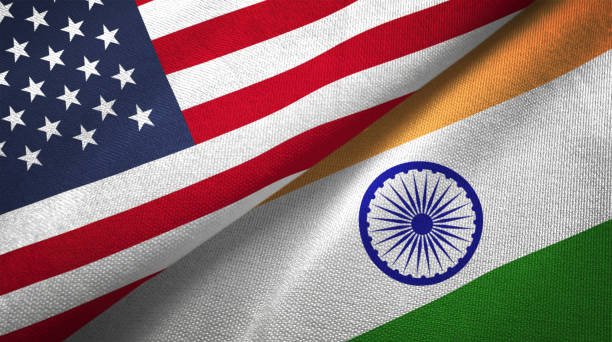India and the United States of America are two of the largest and most influential democracies in the world.
India – USA Relationship: A Global Strategic Partnership
India and the United States of America are two of the largest and most influential democracies in the world. They share common values, interests, and aspirations for a peaceful and prosperous world. They have developed a strong and multifaceted relationship that spans various domains such as trade, defense, energy, education, science, technology, and culture. They also cooperate on regional and global issues such as terrorism, climate change, health, and human rights. In this essay, we will discuss the history, current status, and future prospects of India – USA relationship for students.
History of India – USA Relationship
The history of India – USA relationship can be traced back to the 18th century, when the American Revolution inspired the Indian freedom struggle against British colonialism. The two countries established diplomatic relations in 1946, a year before India gained independence. However, during the Cold War period, the relationship was strained due to the divergent foreign policies of the two countries. India adopted a policy of non-alignment and maintained close ties with the Soviet Union, while the United States supported Pakistan and China as its allies in Asia.
The relationship improved in the post-Cold War era, as the two countries recognized the potential for mutual benefit and cooperation. The end of the bipolar world order, the rise of India as an economic and nuclear power, the emergence of China as a strategic competitor, and the common threat of terrorism brought the two countries closer. The landmark initiatives such as the 1998 Pokhran nuclear tests, the 2000 visit of President Bill Clinton to India, the 2005 civil nuclear deal, the 2008 Mumbai terror attacks, and the 2016 designation of India as a major defense partner paved the way for a deeper and broader engagement between the two countries.
Current Status of India – USA Relationship
The current status of India – USA relationship is characterized by a high level of trust, dialogue, and collaboration across various sectors and levels. The relationship has been elevated to a “global strategic partnership” that reflects the shared vision and values of the two countries. Some of the key features of the current status are:
- Economic Relations: The United States is India’s largest trading partner and inbound FDI source. In 2019-20, the bilateral trade in goods and services reached $146.1 billion1. The two countries have also signed various agreements to enhance cooperation in areas such as energy, infrastructure, innovation, agriculture, health, etc.
- Defense and Security Relations: The United States is India’s second-largest arms supplier and a key partner in enhancing India’s defense capabilities and readiness. The two countries have signed various agreements to facilitate defense cooperation such as Logistics Exchange Memorandum of Agreement (LEMOA), Communications Compatibility and Security Agreement (COMCASA), Basic Exchange and Cooperation Agreement (BECA), etc1. The two countries also conduct regular joint exercises such as Malabar, Yudh Abhyas, Vajra Prahar, etc1.
- Education and Cultural Relations: The United States is a preferred destination for Indian students pursuing higher education. In 2019-20, nearly 200, 000 Indian students enrolled at U.S. colleges and universities, contributing over $8 billion to the U.S. economy2. The two countries also have various programs and initiatives to promote cultural exchange and people-to-people ties such as Fulbright-Nehru Fellowship, International Visitor Leadership Program, etc.
- Regional and Global Relations: The two countries share a common interest in maintaining peace, stability, and prosperity in the Indo-Pacific region and the world. The two countries are part of various regional and global forums such as Quad, East Asia Summit, G-20, etc. The two countries also cooperate on various issues such as counter-terrorism, climate change, cybersecurity, human rights, etc.
Future Prospects of India – USA Relationship
The future prospects of India – USA relationship are bright and promising, as the two countries have immense potential and opportunities to expand and deepen their partnership in the 21st century. Some of the possible areas of cooperation are:
- Trade and Investment: The two countries can work towards resolving their trade disputes and enhancing their economic ties by signing a comprehensive trade agreement that covers market access, tariff reduction, intellectual property rights, etc. The two countries can also explore new avenues for investment in sectors such as digital economy, green technology, space exploration, etc.
- Defense and Security: The two countries can further strengthen their defense cooperation by increasing their interoperability, joint production, and technology transfer. The two countries can also enhance their security cooperation by sharing intelligence, information, and best practices to combat emerging threats such as cyberattacks, biological warfare, etc.
- Education and Cultural: The two countries can further promote their education and cultural cooperation by facilitating student and faculty exchange, joint research, and academic collaboration. The two countries can also increase their cultural cooperation by celebrating their diversity, heritage, and values through various events, festivals, and programs.
- Regional and Global: The two countries can further advance their regional and global cooperation by coordinating their policies, strategies, and actions to address the common challenges and opportunities in the Indo-Pacific region and beyond. The two countries can also support each other’s aspirations and interests in various regional and global platforms such as the United Nations, the World Trade Organization, etc.
Conclusion
India and the United States of America are two of the largest and most influential democracies in the world. They have developed a strong and multifaceted relationship that spans various domains such as trade, defense, energy, education, science, technology, and culture. They also cooperate on regional and global issues such as terrorism, climate change, health, and human rights. The relationship has been elevated to a “global strategic partnership” that reflects the shared vision and values of the two countries. The relationship has a history of ups and downs, but has also shown resilience and adaptability. The relationship has immense potential and opportunities to expand and deepen in the 21st century.
📢 Partner with India CSR
Are you looking to publish high-quality blogs or insert relevant backlinks on a leading CSR and sustainability platform? India CSR welcomes business and corporate partnership proposals for guest posting, sponsored content, and contextual link insertions in existing or new articles. Reach our highly engaged audience of business leaders, CSR professionals, NGOs, and policy influencers.
📩 Contact us at: biz@indiacsr.in
🌐 Visit: www.indiacsr.in
Let’s collaborate to amplify your brand’s impact in the CSR and ESG ecosystem.





























